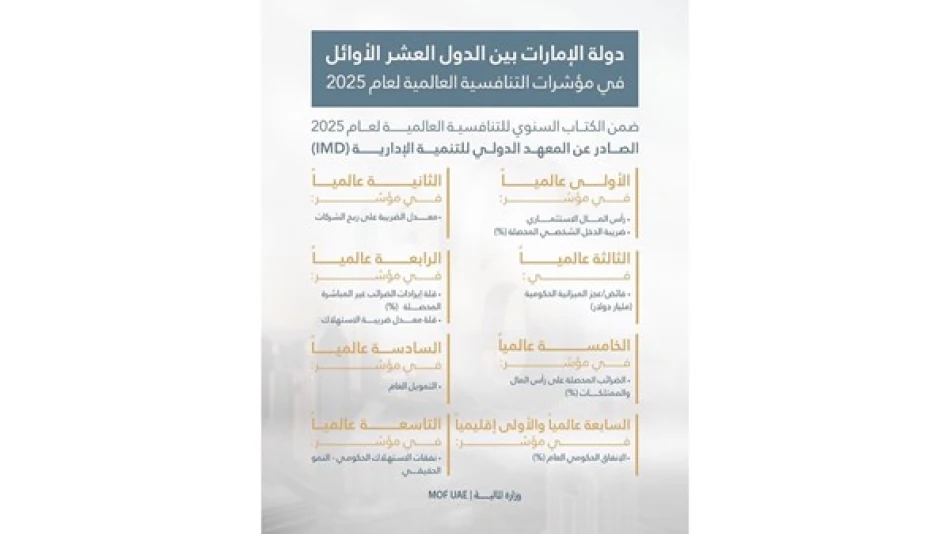
UAE Ranks 16th Globally in Government Support Index: Insights for Businesses and Investors
UAE Surges 27 Places in Global Government Support Rankings, Signals Economic Policy Transformation
The United Arab Emirates has achieved a remarkable leap in fiscal efficiency, climbing from 43rd to 16th place globally in the Government Support Index 2025, according to the International Institute for Management Development (IMD). This dramatic 27-position jump reflects a strategic overhaul of the nation's public spending approach and positions the UAE as a model for effective government resource allocation in an era of global economic uncertainty.
What the Government Support Index Really Measures
The Government Support Index evaluates nations based on the value of government support as a percentage of GDP, serving as a critical benchmark for how effectively countries manage public financial resources. Unlike simple spending metrics, this index measures efficiency – how well governments stimulate economic growth through targeted direct spending policies rather than merely increasing expenditure.
For the UAE, this ranking improvement signals that the country has successfully optimized its fiscal machinery to deliver maximum economic impact per dirham spent, a crucial capability as oil-dependent economies worldwide grapple with energy transition pressures.
Strategic Fiscal Architecture Behind the Success
Federal-Local Coordination Model
The UAE's Ministry of Finance emphasized that this achievement stems from enhanced coordination between federal authorities and local financial departments across the seven emirates. This integrated approach allows for real-time financial analysis and more precise resource allocation – a model that contrasts sharply with the fragmented fiscal systems seen in many federal nations.
Data-Driven Decision Making
Central to the UAE's strategy is the development of sophisticated financial reporting systems that provide accurate statistical data reflecting actual government support levels. This transparency-first approach enables evidence-based policy decisions, moving beyond traditional spending patterns toward measurable outcomes.
Regional and Global Context
The UAE's fiscal efficiency gains come at a time when Gulf states are under pressure to demonstrate economic diversification beyond oil revenues. While Saudi Arabia pursues its Vision 2030 through massive infrastructure spending, and Qatar focuses on World Cup legacy projects, the UAE appears to be taking a more measured approach – optimizing existing spending rather than simply scaling up.
Compared to established fiscal powerhouses like Singapore (which consistently ranks in the top 10) or Denmark (known for efficient public spending), the UAE's rapid ascent suggests that newer economies can achieve competitive fiscal efficiency through strategic modernization rather than decades of gradual improvement.
Broader Economic Performance Indicators
The government support ranking improvement aligns with the UAE's strong performance across multiple competitiveness metrics. The country secured first place globally in venture capital availability and personal income tax collection ratios, while ranking second in corporate tax rates and third in government budget surplus management.
These achievements paint a picture of an economy that has successfully balanced business-friendly policies with effective revenue generation – a combination that many nations struggle to achieve without sacrificing one for the other.
Market and Investment Implications
For international investors, the UAE's fiscal efficiency improvements signal several key advantages. Enhanced government spending effectiveness typically translates to better infrastructure development, more predictable policy environments, and reduced risk of fiscal crises that can destabilize markets.
The emphasis on data transparency and financial governance also addresses longstanding concerns among international financial institutions about emerging market accountability. This could potentially improve the UAE's credit ratings and reduce borrowing costs for both government and private sector entities.
The 2026 Top-10 Ambition
The UAE's stated goal of reaching the global top 10 in government support efficiency by 2026 represents more than political ambition – it reflects a comprehensive understanding that fiscal credibility will become increasingly important as global economic conditions tighten.
Achieving this target would place the UAE alongside traditional fiscal leaders like Switzerland, Luxembourg, and Singapore, fundamentally altering perceptions of Middle Eastern economic management capabilities. More importantly, it would provide the fiscal foundation necessary for the UAE's broader economic diversification goals, from renewable energy leadership to becoming a global hub for emerging technologies.
The rapid improvement trajectory suggests this goal is achievable, particularly given the UAE's track record of meeting ambitious national targets through coordinated government action and private sector partnership.
Most Viewed News

 Layla Al Mansoori
Layla Al Mansoori






